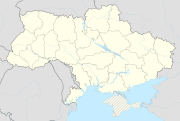Poritschtschja (Jaworiw)
| Poritschtschja | ||
| Поріччя | ||

|
|
|
| Basic data | ||
|---|---|---|
| Oblast : | Lviv Oblast | |
| Rajon : | Javoriv Raion | |
| Height : | 263 m | |
| Area : | 1.119 km² | |
| Residents : | 440 (2001) | |
| Population density : | 393 inhabitants per km² | |
| Postcodes : | 81071 | |
| Area code : | +380 3259 | |
| Geographic location : | 49 ° 53 ' N , 23 ° 46' E | |
| KOATUU : | 4625886401 | |
| Administrative structure : | 3 villages | |
| Statistical information | ||
|
|
||
Poritschtschja ( Ukrainian Поріччя ; Russian Поречье Poretschje , Polish Porzecze or Porzecze Janowskie ) is a village in the western Ukrainian Lviv Oblast with about 440 inhabitants.
It belongs with the villages Jamelnja ( Ямельня ) and Stradtsch ( Страдч ) to the district council of the same name .
history
The place was first mentioned in 1430 as Porzecze , a village under German law , and then appeared variously as Porzecze (1473, 1578), Porzycze (1661–1665), Porzecze Janowskie (1887). The name describes the bank of a river, the surroundings of a river .
The place initially belonged to the Lviv region in the Ruthenian Voivodeship of the aristocratic republic of Poland-Lithuania . During the first partition of Poland in 1772 the village became part of the new Kingdom of Galicia and Lodomeria of the Habsburg Empire (from 1804).
In 1900 the municipality of Porzecze Janowskie had 71 houses with 427 inhabitants, of which 381 were Ruthenian -speaking , 41 German-speaking , 5 Polish -speaking , 350 Greek-Catholic , 25 Roman-Catholic , 30 Jews , 22 of other faiths.
After the end of the Polish-Ukrainian War in 1919, the community became part of Poland. In 1921 the municipality of Porzecze Janowskie had 65 houses with 384 inhabitants, of which 294 were Ruthenians , 73 Poles, 17 Germans, 333 Greek Catholics, 25 Roman Catholics and 26 Protestants .
In the Second World War , the place belonged first to the Soviet Union and from 1941 to the General Government , from 1945 back to the Soviet Union, now part of the Ukraine .
Rottenhan

In 1785, as part of the Josephine colonization, German colonists of the Lutheran denomination settled on the grounds of the village. The colony was called Rottenhan or Rothenhahn and became an independent municipality. The Protestants belonged to the parish Hartfeld in the Evangelical Superintendentur AB Galizien . In the interwar period there was a branch congregation of the Evangelical Church of the Augsburg and Helvetic Confessions in Lesser Poland , which in 1937 had 144 members.
In 1900 the Rottenhan community had 20 houses with 167 inhabitants, 142 of which were German-speaking, 18 Ruthenian-speaking, 7 Polish-speaking, 20 Roman Catholic, 15 Greek Catholic, 132 of other faiths.
In 1921 the Rottenhan community had 19 houses with 130 inhabitants, of which 70 were Germans, 31 Ruthenians, 29 Poles, 77 Protestants, 42 Greek Catholics, 29 Roman Catholics.
Web links
- Porzecze (3) Janowskie . In: Filip Sulimierski, Władysław Walewski (eds.): Słownik geograficzny Królestwa Polskiego i innych krajów słowiańskich . tape 8 : Perepiatycha – Pożajście . Walewskiego, Warsaw 1887, p. 835 (Polish, edu.pl ).
- Rottenhan al. Rothenhahn . In: Filip Sulimierski, Władysław Walewski (eds.): Słownik geograficzny Królestwa Polskiego i innych krajów słowiańskich . tape 9 : Poźajście – Ruksze . Walewskiego, Warsaw 1888, p. 812 (Polish, edu.pl ).
Individual evidence
- ^ Anna Czapla: Nazwy miejscowości historycznej ziemi lwowskiej [The names of the villages in the historic Lviv region] . Towarzystwo Naukowe Katolickiego Uniwersytetu Lubelskiego Jana Pawła II, Lublin 2011, ISBN 978-83-7306-542-0 , p. 160 (Polish).
- ↑ a b Ludwig Patryn (ed.): Community encyclopedia of the kingdoms and countries represented in the Reichsrat, edited on the basis of the results of the census of December 31, 1900, XII. Galicia . Vienna 1907.
- ↑ a b Główny Urząd Statystyczny: Skorowidz miejscowości Rzeczypospolitej Polskiej. Tom XIII. Województwo lwowskie . Warszawa 1924 (Polish, online [PDF]).
- ↑ Henryk Lepucki: Działalność kolonizacyjna Marii Teresy i Józefa II w Galicji 1772-1790: z 9 tablicami i MAPA . Kasa im. J. Mianowskiego, Lwów 1938, p. 163-165 (Polish, online ).
- ↑ Schematism of the Evangelical Church in Augsb. and Helvet. Confession in the kingdoms and countries represented in the Austrian Imperial Council . Vienna 1875, p. 209 ( online ).
- ↑ Stefan Grelewski: wyznania protestanckie i sekty religijne w Polsce współczesnej . Lublin 1937, p. 276-281 (Polish, online ).

